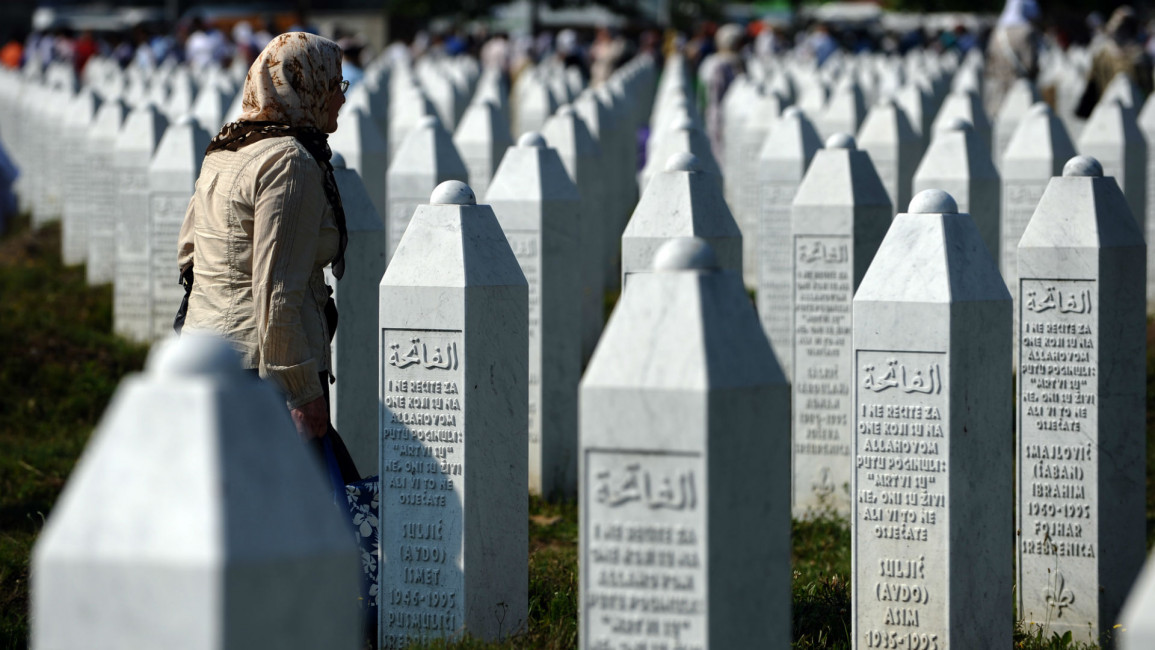'Butcher of Bosnia' Ratko Mladic faces historic war crimes verdict
Mladic, 74, is accused of 11 counts including genocide, war crimes and crimes against humanity committed in the break-up of the former Yugoslavia as the head of Bosnia's Serb-dominated army.
He is notorious for his role in commanding Bosnian Serb troops who in mid-1995 overran the "safe" enclave of Srebrenica in eastern Bosnia and slaughtered almost 8,000 Muslim men and boys in a matter of days, dumping their bodies in mass graves.
The judgement and possible sentencing before the Yugoslav war crimes court in The Hague marks the culmination of a case spanning 22 years against Mladic, once dubbed "The Butcher of Bosnia".
Mladic is one of the "first cases which in fact justified the creation of the International Criminal Tribunal for the former Yugoslavia," chief prosecutor Serge Brammertz said recently.
Wednesday's decision will also be the court's penultimate ruling as it prepares to close on 31 December after more than two decades.
Twitter Post
|
Prosecutors say Mladic played a pivotal role in a ruthless campaign of ethnic cleansing to create a Greater Serbia during Bosnia's bloody 1992-95 war which claimed 100,000 lives and left 2.2 million others homeless.
Genocide
The killings at Srebrenica are deemed the worst atrocities committed in Europe since the Second World War and have been labelled genocide by two international courts.
Mladic is also accused of ordering a 44-month-long campaign of sniping and shelling against Bosnia's capital Sarajevo to terrorise its inhabitants, killing 10,000 people, mostly civilians.
Prosecutors further blame him for the hostage-taking of 200 UN peacekeepers and allegedly ordering his troops to "cleanse" Bosnian towns, driving out Croats, Muslims and other non-Serb residents. They have called for a life sentence.
Mladic told judges he was "sorry for every innocent that was killed on all sides, in all ethnic communities in Yugoslavia", but has continued to deny the charges.
Mladic was arrested in May 2011 at his cousin's home after almost 16 years on the run, telling judges at his first court appearance in 2011 that "I defended my country and my people (and) I now defend Ratko Mladic before you".
During hearings, he frequently clashed with prosecutors, judges, witnesses and even onlookers in the public gallery.
 |
The killings at Srebrenica are deemed the worst atrocities committed in Europe since the Second World War and have been labelled genocide by two international courts. |  |
In one infamous moment as his trial opened in 2012, Mladic was seen making a throat-cutting gesture towards a victim's relative.
Mladic has called the charges against him "obnoxious" and referred to the ICTY as a "satanic court".
He also refused to testify in the trial of Bosnian Serb leader Radovan Karadzic, his political alter ego, who is currently appealing a 40-year jail term imposed last year for similar charges.
Mladic's lawyers have insisted he is "not a monster" and urged that he be acquitted on all charges.
Over the years his health has deteriorated, and Mladic has suffered three strokes, but judges dismissed a last-minute defence bid to postpone the verdict on medical grounds.
'Bodies everywhere'
During a complex trial lasting 523 days, almost 10,000 exhibits were admitted in evidence and there were almost 600 witnesses. They provided hours of harrowing testimony including from protected witness RM-346, who told how he survived Srebrenica.
"There were a lot of dead bodies. Brains were splattered all over," said the man, who escaped despite being seriously wounded.
Mladic, Karadzic and former Yugoslav president and Serbian strongman Slobodan Milosevic were among the top leaders, who prosecutors said formed the core of a "joint criminal enterprise" to create a Greater Serbia.
But Milosevic died before judgement could be passed, suffering a heart attack in his cell in The Hague in March 2006.
"The Mladic judgement, together with the Karadzic judgement is one of the most important in the history of the tribunal," said Brammertz.
There have long been accusations from Serbia the ICTY was a "political" institution, which had hampered reconciliation.
But Brammertz has insisted "no one can expect a judicial process to achieve reconciliation".
"I am personally absolutely convinced... that without accountability there is no chance of reconciliation at all."


![President Pezeshkian has denounced Israel's attacks on Lebanon [Getty]](/sites/default/files/styles/image_684x385/public/2173482924.jpeg?h=a5f2f23a&itok=q3evVtko)



 Follow the Middle East's top stories in English at The New Arab on Google News
Follow the Middle East's top stories in English at The New Arab on Google News


